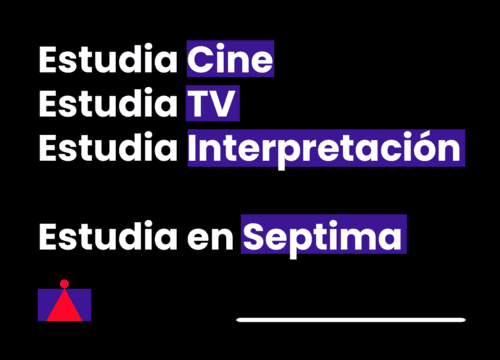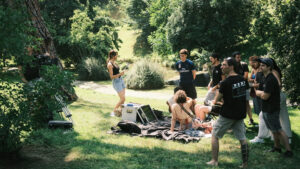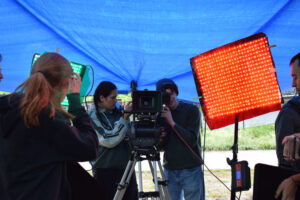Un director de cine debe dominar completamente todas las facetas de una película. Esto no quiere decir que lo haga todo él. El cine es un trabajo en equipo, pero como responsable de la película, el director de conocer los fundamentos de los elementos que la componen y que los responsables de cada departamento se encargarán de desarrollar completamente.
Si quieres ser director de cine, no dudes en ver muchas películas, muchas series de televisión, míralas con ojos diferentes… y luego rueda mucho, pon lo aprendido en práctica junto a estudiantes como tú, cada uno realizando las funciones que le correspondan.
El análisis de películas es una gran herramienta de aprendizaje, en la escuela la utilizamos mucho. Hoy como ejemplo traemos un extracto del análisis de Reservoir Dogs, la película que lanzó a la fama a Quentin Tarantino, realizado por Tasteofcinema.com y que allá por 1992 algunos tuvimos el privilegio de ver en los Cines Alphaville en versión original subtitulada. Elementos como el guión, el montaje, la secuencia de apertura… hacen que Reservoir Dogs sea una película diferente. Mira por qué:
«Quentin Tarantino is one of the biggest names in Hollywood, and with his most recent film “Django Unchained” being his highest grossing film to date, it’s hard not to give the man respect. He started off as an Indie darling and has risen through the upper echelon of the business where when he speaks (and he will, at great length), people listen. He’s gotten to the point where anything he touches can just about get greenlit, and has the ability to pick and choose his projects.
With the news that we’ll not be seeing “The Hateful Eight” on the big screen, we all clamor to the Internet wondering what he’ll do next. However, QT wasn’t always the top dog, as he had very humble roots where he clawed his way up from being a script doctor to a director. A chance encounter with QT’s longtime producer Lawrence Bender and Harvey Keitel’s wife lead us to having one of the more unique filmmakers in Hollywood.
Film students love him, and with good reason – he’s an inspiration. Here’s a man who said “no!” to traditional film schools and learned filmmaking like a lot of kids did, by watching movies. So, it’s only fitting to make a list dedicated to just that – learning from watching his film “Reservoir Dogs”.
Made for $1.2 million dollars, the film was a breath of fresh air for many moviegoers and critics and showed us that young filmmakers have a creative, new voice that needs to be heard. While QT wasn’t the only filmmaker to come out of the ’90s Independent scene, he’s one of the few that’s made a large impact. So, grab a pen, paper and a Big Kahuna Burger, and let “Reservoir Dogs” make you a better filmmaker.
1. Scripting Your Film

This lesson is a little more unique, because it’s not entirely based on what you can see while watching the film, but is still an extremely important part of the the filmmaking process. Writing is the backbone to a film, and without a good script there will never be a good movie. The issue is, while you can learn a lot from watching a film, a writer can’t learn to write a screenplay by watching a film. Sure, you can learn a lot about visual storytelling, but the only way to really learn to write is to read.
Quentin Tarantino’s script for “Reservoir Dogs” should be required reading for any young aspiring filmmaker or screenwriter because it’s a useful tool. One thing that Tarantino did with his early scripts was he essentially edited the film with his writing and figured out the pacing that way.
When you read his script you’ll realize his action and description is broken up in such a way that almost feels like cuts, so when there are a lot of small sections we know it’s meant to be a little more fact paced. It’s an interesting way to write and a good resource to learn screenwriting.
2. Editing

Tarantino has had a lot of collaborators throughout his long career, but I’d argue that none have been nearly as important to his growth as a visual filmmaker than his longtime editor and close friend, the late Sally Menke (1953-2010).
A director is only as good as his editor, because without a good editor who sees the vision the director is going for, all could be lost. When editing your film, whether you’re doing it yourself or working with an editor, you need to find the flow of the scene and find your voice! One thing that works so well in the film is how Menke and Tarantino take their time in a scene.
If a scene is meant to felt chaotic, it might cut around a bit, but neither person is afraid to hold on a great moment. Why cut away if everything you need is in one shot? Granted, this won’t work for everyone or everything, but the two understood each other and had different approaches to a scene.
One thing that Menke would do is to cut the scene to work emotionally and dramatically, and then Quentin would come in with a piece of music and cut for music beats. It’s an interesting way to work, but it helps shape QT’s unique style. Find your style in the edit, because in the edit is when your film is really made.
3. A Strong Opening Scene

In school, teachers will tell you that your first sentence of your opening paragraph is the most important because it’s what you use to hook the reader. This is a completely true statement, and can also be applied to the art of filmmaking. If you have a weak opening, you lose your audience and Tarantino knows this as well as anyone. He also knows, that by taking a risk, you can have a large payoff in the end. “Reservoir Dogs” is interesting, because it breaks a big rule that a lot of Hollywood filmmakers follow – don’t begin your film with a long dialogue scene!
The thought process is that audiences aren’t usually 100% settled yet, so to throw so much at them can be problematic. Another thing that we’re taught while writing screenplays is that we should know your story and your characters within the first 10mins. Another rule QT destroys, because if you’re going to make independent film, might as well march to the beat of your own drum.
This scene works not because it’s 5 dudes sitting around, it works because it’s entertaining. They’re not talking about themselves or talking about their job, because we have NO idea why they’re even together. We just know that they’re shooting the shit in a very casual, entertaining way. It tells us a lot about the characters, without knowing them.
Once again, this tactic won’t always work and few writers have the ear for dialogue that QT has, but it should inspire you to think outside the box. He made a heist film that didn’t begin like any other heist film people had seen, and that’s what made it interesting. Your opening scene is your hook, so don’t rush it. Make it so that after seeing your opening scene we can’t help but sit and watch the rest of the film.
4. Dialogue

As previously said, Quentin Tarantino has an ear for dialogue so unique, it’s unlike other screenwriters working today. He is able to find a way to write characters that sound like real people, but at the same time don’t talk like anyone you’ve ever met. It’s almost a contradiction, but it works. Writing dialogue is hard, don’t let anyone tell you it’s not and it can be especially frustrating for beginner writers.
Part of the key to dialogue is not living completely in your head and performing your dialogue as you write. You need a basis for how the character sounds, and a lot of time it’s incredibly difficult to find a unique voice for each character in your beginning scripts.
What Tarantino claims to have done in his films is he based characters off friends of his and a lot of conversations said in “Reservoir Dogs”, “Pulp Fiction” and “True Romance” came directly from his friends; almost word-for-word. The point to this is not to mimic what Tarantino does and to go and add a long, eleven-page dialogue scene about Madonna to your script. No, it’s about finding your voice and using a filmmaker like QT as your inspiration.
Go to the mall and listen to everyone. Listen to people’s conversations. Listen to how people speak. If you’re writing a script and your character sounds too much like yourself, change them! You don’t want every character sounding the same. Steal from the people around you. Quentin himself once said “I steal from everything. Great artists steal; they don’t do homages…”
Leer el artículo entero: www.tasteofcinema.com






